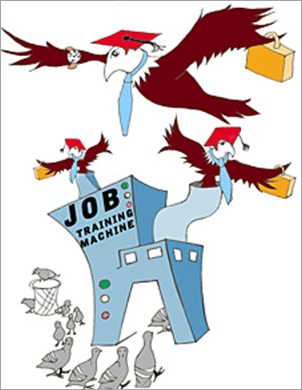Largely overlooked in the ongoing battles over school governance and the budget, Mayor Michael Bloomberg did something completely outrageous last month--he presented a balanced welfare reform plan for New York City.
A welfare proposal that reaches out to businesses, requires that people work and provides them with needed social supports is almost unheard-of in the polarized world of welfare reform, where there's never been much middle ground between coddling the poor and kicking them. Nevertheless, the mayor both pledged to continue the city's striking progress in reducing welfare dependency and indicated that the city can and should do more to help its working poor and those left on the rolls to move toward self-sufficiency. Recipients should work for their benefits, Bloomberg affirmed, but in return the city should provide access to supports such as childcare, job training, housing assistance and substance-abuse counseling.
Unfortunately, New York City's balanced approach is in direct contrast to what's going on in Washington. President George W. Bush and the House of Representatives have embraced a limited and punitive approach to welfare that would make a mockery of once-sacred Republican principles: letting states and localities decide what's best for themselves, and opposition to imposing mandates on states without granting new funds to meet them. The major provisions of their plan include raising work participation requirements, limiting state flexibility to work with recipients, and cutting access to job training, education, childcare and other key supports. If the U.S. Senate adopts this approach, these measures would incinerate virtually every aspect of the mayor's plan.
There's considerable irony to that, since the Bush plan, in its harshness and one-size-fits-all approach, has a strong flavor of the Work Experience Program, championed by former Mayor Rudolph Giuliani and still lionized by conservatives here and nationally. Right-wingers love this program despite a near-total lack of evidence that it was effective in moving welfare recipients into unsubsidized private jobs. Giuliani never allowed independent observers enough access to data to perform any meaningful evaluation, claiming (with a straight face) that such a study would violate the participants' privacy.
During its run, there were at least 100,000 participants in Giuliani's program. According to surveys, the overwhelming majority of participants denied that it helped them find real jobs. And the National Governors Association recently found that in 40 states, which had experimented with WEP-like welfare programs, "workfare" had been less effective in preparing participants for unsubsidized jobs than other approaches, including job search activities, education and vocational training. Research has indicated that a mix of work-related activities and short-term, job-focused training is most effective. But advocates from both sides of the political spectrum expect that the president's plan, if enacted into law, would divert resources from the variety of programs across the country, which are currently customized to account for local conditions and needs, in order to meet the law's requirements.
Rather than attempting to force the issue by herding welfare clients into mandatory work programs, the Bloomberg plan approaches welfare reform in part as a way to add value to the city economy, improving recipients' work skills and reaching out to the business community in ways that meet their needs.
"Training and education should be closely tied to the needs of city businesses, and lead to real jobs," the mayor declared. Indeed, the city's Human Resources Administration--a stalwart foe of most forms of job training under Giuliani--has been quietly working for months on a collaborative effort with the Economic Development Corporation to offer $5-million worth of customized job-training services to city employers. Exploring possible linkages between reducing welfare dependency, supporting city employers and abetting economic development could have great potential benefit for all New York.
The mayor's proposal for how federal welfare money should be used represents an enlightened attempt to grapple with the realities of a slow economy and a troubled population that can't just be coerced or threatened into achieving self-sufficiency. Rather than engaging in meaningless rhetoric about "perpetuating dependency" or "pampering the poor," we should hope that this thoughtful and balanced approach gains traction in the halls of Congress.


